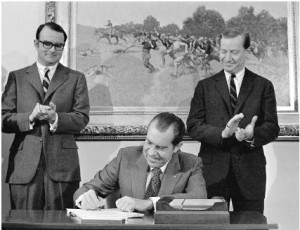Gary Wisenbaker, Valdosta Today Editorial Director:
The issue is now joined and an epic battle of wills has erupted between the people’s elected representatives in Congress and the Executive Branch’s appointed administrators in the Environmental Protection Agency. The former insists on the rule of law; the latter on the rule of regulation without regard to any law.
 The battle is over the “Waters of the USA” rule, first proposed last summer, set to take effect within the next 60 days. The rule seeks to redefine and expand the term “navigable waters”. The description is important because it limits the reach of the EPA under the Clean Water Act, passed by a Democrat controlled Congress and signed into law by a Republican president, Richard Nixon, in 1972. As originally intended, the EPA could only regulate those waters that were interstate in nature, not intrastate.
The battle is over the “Waters of the USA” rule, first proposed last summer, set to take effect within the next 60 days. The rule seeks to redefine and expand the term “navigable waters”. The description is important because it limits the reach of the EPA under the Clean Water Act, passed by a Democrat controlled Congress and signed into law by a Republican president, Richard Nixon, in 1972. As originally intended, the EPA could only regulate those waters that were interstate in nature, not intrastate.
“Among the reasons [for such a limitation], Congress did not want EPA bullying farmers over small depressions in their land that occasionally hold rainwater, bullying people who dig a ditch to help drain their land, and using the smallest of streams and micro-bodies of water to restrict property use,” said Jay Lehr, science director for the Heartland Institute. Lehr added, “EPA is attempting to stand the CWA on its head as it continues to seek more money and power.”
Imagine that. A federal bureau seeking more money and power.
The revised rule redefines which bodies of water are subject to federal regulation and would now include “all tributaries, adjacent waters, wetlands and other waters.” That ditch in your backyard that sometimes after a rain has enough water to flow into a stream, which empties into a creek, which runs into a river would be subject to regulation under the rule.
Get a permit from the Army Corps of Engineers before you dig out any accumulated silt. Or else.
The CWA allows the EPA to issue administrative orders against violators, and seek civil or criminal penalties when necessary. For example, a first offense of criminal negligence, the minimum fine is $2,500, with a maximum of $25,000 fine per day of violation. A violator may also receive up to a year in jail. On a second offense, a maximum fine of $50,000 per day may be issued.
Thus, one can be fined and imprisoned not for transgressing a law but an administrative rule.
WOTUSA, however, elucidates more than just a money and power grab by a federal agency, it illustrates the sheer arrogance of an administration and an agency
Obama’s EPA is defying recent Supreme Court rulings against it regarding its definitions of “navigable” and “interstate” waters. They have been told at least twice in the last 15 years that the proposed WOTUSA definitions, or similar definitions seeking to control otherwise non-regulative waters, were overly broad. For this legal limitation they have no regard but disdain.
 In 2001 the Supreme Court ruled in SWANCC v. U.S. Army Corps of Engineers that the EPA could not regulate intrastate waterways because migratory birds might use them. The court held, in part, “The term ‘navigable’ has…the import of showing us what Congress had in mind as its authority for enacting the CWA: its traditional jurisdiction over waters that were or had been navigable in fact or which could reasonably be so made.”
In 2001 the Supreme Court ruled in SWANCC v. U.S. Army Corps of Engineers that the EPA could not regulate intrastate waterways because migratory birds might use them. The court held, in part, “The term ‘navigable’ has…the import of showing us what Congress had in mind as its authority for enacting the CWA: its traditional jurisdiction over waters that were or had been navigable in fact or which could reasonably be so made.”
And again, in Rapanos v. US (2006) the court held that “the definitional term ‘waters of the United States’ can only refer to relatively permanent, standing or flowing bodies of water, not occasional, intermittent, or ephemeral flows. Furthermore, a mere ‘hydrological connection’ is not sufficient to qualify a wetland as covered by the CWA; it must have a continuous surface connection with a water of the United States that makes it difficult to determine where the ‘water’ ends and the ‘wetland’ begins.”
The Obama Administration is once again proposing job killing rules that would require construction companies, farmers and other real estate intensive enterprises, the vast majority of which are family owned, to obtain expensive, time consuming CWA permits not previously required.
In Georgia alone, the rule would put an additional 40,000 miles of Georgia streams under federal control. Should that happen, then roughly 57 percent of all Georgia waterways would be subject to direct federal regulation. That’s a lot of intrastate water controlled by an act intended to affect only interstate waterways.
Although 33 states, the National Association of Homebuilders, the American Farm Bureau, and 200 other groups have opposed the rule, the EPA is moving forward without regard to the costs or property rights at risk. WOTUSA is the government’s divining rod to find and use water as a way to transfer more property rights away from the private landowner and reinvest those rights in the regulators. They will not willingly let it go.
The US House of Representatives, recognizing this breathtaking overreach, has passed bipartisan legislation seeking to block the rule’s implementation. Similar measures are moving through the Senate. Obama, for his part, has vowed a veto.
Rep. Lyn Westmoreland (R-GA) probably said it best, “Telling farmers that the water on their property is now federally regulated and subject to fines tramples on property rights and is exactly the kind of abuse of power our forefathers warned against.”
While the congressman is right, merely reining in the EPA on a case by case basis simply isn’t enough. Congress must reclaim its rightful and exclusive power to legislate federally and insist that its laws, and only its laws, are implemented and executed.
And unless and until that is done, the Congress may well find itself regulated—and relegated–into irrelevancy.
 Gary Wisenbaker, B.A., J.D. is a native of South Georgia where he practiced law in Valdosta and Savannah for 31 years. He has served as state chairman of the Georgia Young Republicans and Chairman of the Chatham County (Savannah) Republican Party. Gary is a past GOP nominee for State Senate, past delegate to the Republican National Convention and has consulted on numerous local Republican campaigns as well as chaired or co-chaired campaigns for President and US Senate on the county and district level. He is the principal and founder of Blackstone, LLC, a corporate communications and public relations concern as well as Wiregrass Mediation Services, LLC, a general civil litigation mediation firm.
Gary Wisenbaker, B.A., J.D. is a native of South Georgia where he practiced law in Valdosta and Savannah for 31 years. He has served as state chairman of the Georgia Young Republicans and Chairman of the Chatham County (Savannah) Republican Party. Gary is a past GOP nominee for State Senate, past delegate to the Republican National Convention and has consulted on numerous local Republican campaigns as well as chaired or co-chaired campaigns for President and US Senate on the county and district level. He is the principal and founder of Blackstone, LLC, a corporate communications and public relations concern as well as Wiregrass Mediation Services, LLC, a general civil litigation mediation firm.
Gary hosts his own blog at www.garywisenbaker.com and recently published his first fictional work, “How Great is His Mercy: The Plea”, on Amazon.com. His opinions are regularly published on ValdostaToday.com and Zpolitics.com.











